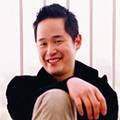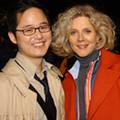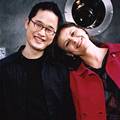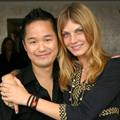如果瑪莎‧史都華(Martha Stewart)在她即將鋃鐺入獄時真的擁有新世代覺醒的話(她剛買下Body & Soul雜誌,謠傳她企圖給她的生活品味王國帶來至少一點綠意。)也許她該跟一名年方27歲,卻早以環保生活專家聞名的競爭者好好學習。
 那便是丹尼‧徐,前兒童環保運動人士,在12歲時創立了環保組織,並加以經營成為價值連城的搖錢樹、來自白宮的邀請函以及主流通俗雜誌的報導──全都在他高中畢業以前。隨後他離開華府社交政治圈(Beltway)前往更耀眼的領域。現在他是明星們的環保顧問,《有機品味》(Organic Style)特約編輯,時尚、美容及家庭用品設計師,三本在出版版圖上開創「生態時尚」(eco-chic)類別的書籍作者,以及(還沒完啊?)從精品飯店連鎖到手機回收配備等公司的環保顧問。
那便是丹尼‧徐,前兒童環保運動人士,在12歲時創立了環保組織,並加以經營成為價值連城的搖錢樹、來自白宮的邀請函以及主流通俗雜誌的報導──全都在他高中畢業以前。隨後他離開華府社交政治圈(Beltway)前往更耀眼的領域。現在他是明星們的環保顧問,《有機品味》(Organic Style)特約編輯,時尚、美容及家庭用品設計師,三本在出版版圖上開創「生態時尚」(eco-chic)類別的書籍作者,以及(還沒完啊?)從精品飯店連鎖到手機回收配備等公司的環保顧問。
2004年他打算(在一家還不知道名字的電視台)開始一個叫「超級自然品味」(SuperNatural Style)的實境電視節目,內容是關於……你猜對了,是關於環保生活。它將包含從高科技環保屋,有機花園、時尚、烹飪、娛樂到寵物照顧的一切。首要的主題是:作環保很簡單,更不用說也很時髦、新潮、省力…噢對了,還有對地球友善。他相信環保運動最好加緊腳步並增加一點性吸引力,同時也向生態人士挑戰,要求他們不要因他囊括六個年度風雲人物,並將星巴克及奇異(GE)公司名列最欣賞的企業而心懷怨恨。
但在變得像傳統消費主義一樣問題叢生以前,「生態消費主義」到底有多少可行的空間?Grist Magazine近日致電給丹尼‧徐在賓州的農場(作為「超級自然品味」節目的實驗室與佈景之用),討論美國是否真能從環境問題中買出一條生路、名人們為哪些急切的生態困境尋求他的協助、以及他為何對政治感到厭倦。
問:描述你成為環保運動人士的成長過程,是什麼促使你這麼早便投身政治?
答:這事我已經講過一百萬次了,我會試著不要略過細節。這發生在我生日那天:我在地球日出生。我想,當你是個小孩而你的生日和某節日同一天時,它當然會對你有些影響。每年我生日的時候,都會有些關於地球處境及鯨魚和雨林問題,以及和這些相關的駭人恐怖故事。因此每年生日時我都在納悶世界末日是否就要來臨了。
步入12歲時,我單純地相信我所讀到的每個問題,同時也懷抱理想,相信自己能解決它們,於是我決定在12歲生日那天創建一個環保團體。這是一份禮物,來自所有參加生日派對的朋友們。我那時好像是說「你們可以留著所有帶來的禮物,我不想要,但你們得做點別的事來代替。」大家都以為我想要現金,但我說:「我要成立一個團體,希望你們成為裡頭的創始成員。」這個團體(Environment 2000)在我18歲時,從12名成員成長到25,000名成員。
問:你如何在那個年紀學到社會運動的訣竅?
答:這是我生命中真正像個「環保人士」的一段日子。當時沒有多少成人在支撐或運作Environment 2000,只有一群青少年。我學習從游說陳情、立法程序到公共關係、募款及民間活動的一切。我們非常有效地杯葛了像Eddie Bauer這樣的公司,使他們終止皮草的使用。我們學到如何善用媒體,因為我們發現他們喜歡報導年輕人,可以利用媒體來傳達訊息和招募成員。我們從未費盡心思去吸引成員,他們都是自己找上門來的,贊助者也找上我們。我們只是從實踐中學習而已。我甚至在13歲時自己填寫稅務法規501(c)(3)的非營利組織免稅申請表,但裡頭拼字錯誤之多,我簡直不明白財政部賦稅署是怎麼通過的。
問:所以這不只是課外活動?
答:我中學被當,沒有任何擅長的項目,也沒有課外活動。你總是聽說那些故事,年輕人為理想奮鬥但也同時在班上名列前矛之類的事蹟。他們就像有超級非凡成就的人,非常閃亮、非常完美,幾乎有些讓人毛骨悚然。我可不是,我不打算上大學,也沒有計畫讓自己揚名立萬。
問:但你的名號還是從此成為暢銷招牌,你簽下寫書合約、電視節目、產品生產線,還為連鎖飯店作設計。
 答:我其實沒有用什麼策略,我只能說,傻人有傻福。現下我經營事業,而且有個不只是商業性的企業組織,這裡當然有個完整的策略,而我們也知道自己的方向。但約莫 22歲以前,我仍只是隨波逐流,有什麼就拿什麼,也沒有多想。我說的是我第一份寫書合約,我唯一做的事就是回覆出版商蘭登書屋(Random House)的電話。
答:我其實沒有用什麼策略,我只能說,傻人有傻福。現下我經營事業,而且有個不只是商業性的企業組織,這裡當然有個完整的策略,而我們也知道自己的方向。但約莫 22歲以前,我仍只是隨波逐流,有什麼就拿什麼,也沒有多想。我說的是我第一份寫書合約,我唯一做的事就是回覆出版商蘭登書屋(Random House)的電話。
問:你為什麼棄政治運動而就商業組織?
答:那本書完全是在講經營青少年組織,算是告訴青少年如何改變世界的入門書。我拿到一筆足夠的預付金給我經濟上的自由,可以離開中學到我想要的任何地方自己生活。所以我決定搬到華盛頓首府,在那裡自願為好幾個組織擔任遊說保護原始森林的工作。我覺得這對我真的一點吸引力都沒有。在政府層級工作實在充滿挫折感。
問:怎麼講?
答:你也知道那是什麼樣子的,而且這聽起來實在像個過於天真的評論,但華府是個非常政治的都市,想待在那裡你得熱愛政治才行。而在我被邀請與副總統高爾(Al Gore)會面時,我了解到它並不適合我。我在白宮和其他充滿政治熱忱的年輕人一起,他們對與高爾會面都非常興奮,而整個過程我唯一能想得到的就是,如果把餐巾帶走不知道會不會有人注意到。能在雞尾酒會裡有白宮的餐巾該有多好啊!
問:所以你對派對的興趣更甚於政治。你在那時就決定轉換跑道了嗎?
答:在我第二本書即將出版時,我邀請了當時寫這本書評的華盛頓郵報記者到家裡作客,她不停地對傢俱和我上的菜餚發問,最後刊出了一篇有關生活方式的報導:「這是不是生活方式的新潮流呢?你吃飯和生活的方式會不會是改變世界的新方法呢?」那多少在我心中埋下種子。我想,這正是我們沒在社會運動中作到的──我們要求人們改變生活方式,卻沒有告訴他們該怎麼做。為什麼不提供所有如何做的資訊,讓它美好且世俗,不要過於政治化,僅只是生活方式而已。我一直在想,如果瑪莎 ‧史都華(Martha Stewart)是個環保人士?你能想像她將如何改變這個國家嗎?
問:但就算不曾流行過,它的確自70年代起就是一種生活運動。
答:短短5年前,健康食品店都還是個滿是灰塵、放著過期食物髒兮兮的地方,美容產品選擇有限,服飾,更不用想了。床寢傢俱看來都如出一轍,了無新意。你想盡辦法找到的都是些哄抬價格質感不佳的東西。你並不想要「它好像對你有好處」這樣的產品,而應該是:你渴望它。
問:通用電氣和星巴克都是大型跨國企業,因此被迫縮減成本開支、使用廉價勞工、輸入境外資源並摧毀當地產業,更不用提這些公司的環境措施都有許多問題,尤其是通用電氣,這會使你感到不安嗎?
答:我想這未免過於武斷了。並不是所有的大型跨國企業都對當地的社會與需求漠不關心,有的公司是那樣沒錯,但還有很多像星巴克和通用電氣這樣的公司,其實非常在意企業社會責任,並努力擺脫企業怪獸的形象。最重要的是,這些是影響力最大的公司,能真正贊助具有突破性的科技研究。看看汽車產業,它們全都是些大公司。我們不能一竿子打翻一船人,事實上,這些企業正是人們消費的地方。
問:你給名人們做什麼樣的咨詢服務?
 答:一開始我的事業與好萊塢沒有任何關係,我從未自動請纓,毛遂自薦上門為任何演員、女演員或音樂家工作。可是一旦你寫了幾本書,你便成為該議題的權威。我真的不是主動想跟明星們攪和,是他們自己來找我的,因為這些名人遇到一些問題,他們想知道如何做才正確並希望成為榜樣,這樣的例子有太多太多了。
答:一開始我的事業與好萊塢沒有任何關係,我從未自動請纓,毛遂自薦上門為任何演員、女演員或音樂家工作。可是一旦你寫了幾本書,你便成為該議題的權威。我真的不是主動想跟明星們攪和,是他們自己來找我的,因為這些名人遇到一些問題,他們想知道如何做才正確並希望成為榜樣,這樣的例子有太多太多了。
問:舉例來說?
答:有位女演員真的很關心「衝突鑽石」(conflict diamonds)的問題,但她被迫必須穿著珠寶參加首映典禮,於是我和她一同尋找具有認證的鑽石,能證明鑽石的開採地與開採者都和「衝突鑽石」無關。也有名人打電話來問,他們有個游泳池但不想以氯消毒,該如何造個淡水游泳池?我很高興能幫他們的忙,因為在上脫口秀或接受訪問時他們可以談論這些事──事實上,流行文化有很大一部份時這些名流所塑造的,這是現實。
有位女演員在接受訪問時說;「我穿的是百分之百的再製喀什米爾羊毛。我很認同穿著再製材質這個做法,同時看起來很美,我喜歡它。」這個講法很聰明,讓它不只是環保意識而已,也相當性感。喔我的天哪!真有趣──她正好傳簡訊來問我是否覺得她像吹牛老爹(P. Diddy)那樣,弄件「不投票,毋寧死」(Vote or Die)的T恤來穿穿。
問:有哪些高級時裝系列和你合作?在高級時尚的世界裡有什麼人做了像樣的環保工作?
 答:我為Imitation of Christ設計了兩季。喬治歐‧亞曼尼(Giorgio Armani)做了很多—─他使用很多大麻纖維和有機材質。事實上我只是拿他舉個例子而已。像凱瑟琳‧漢耐特(Katherine Hamnett)也做了很多,史黛拉‧麥卡尼(Stella McCartney)很棒──她的鞋子和配件用的都是人造皮革,但不是聚氯乙烯基(PVC)的合成物,是聚甲胺酯基(polyurethane)的,所以對環境不是那麼糟糕,而產品也很漂亮,這對動物權利人士來講實在很棒。在洛杉磯還有很多專攻再製纖維、名氣較小的設計師。
答:我為Imitation of Christ設計了兩季。喬治歐‧亞曼尼(Giorgio Armani)做了很多—─他使用很多大麻纖維和有機材質。事實上我只是拿他舉個例子而已。像凱瑟琳‧漢耐特(Katherine Hamnett)也做了很多,史黛拉‧麥卡尼(Stella McCartney)很棒──她的鞋子和配件用的都是人造皮革,但不是聚氯乙烯基(PVC)的合成物,是聚甲胺酯基(polyurethane)的,所以對環境不是那麼糟糕,而產品也很漂亮,這對動物權利人士來講實在很棒。在洛杉磯還有很多專攻再製纖維、名氣較小的設計師。
但話說回來也有像Dolce & Gabbana那樣的設計師──他們實在太糟糕了。我不但不和他們合作,還在洛杉磯舉行派對,要所有賓客簽署大型請願書要求他們停止使用毛皮。他們在歐洲使用幼海豹毛皮並將其製成大衣,那不是很駭人嗎?
問:在所有你合作過的名人中,有誰讓你覺得真正投入其中的?
答:說真的我不便指名道姓的。
問:你認為這年頭名人比政治人物更有說服力嗎?
答:並不盡然,但他們的確引領潮流。如果我能使他們為環保產品背書並開創環保潮流,不是很好嗎? (全文完)
If Martha Stewart really is having a new-age awakening as she prepares to enter the clink (she just bought Body & Soul Magazine and rumor has it she intends to give her lifestyle empire a hint, at least, of green), she might want to take notes from one competitor who, at the tender age of 27, is already burnishing his reputation as America's reigning environmental lifestyle expert.
That would be Danny Seo, the former pre-teen activist who founded an environmental organization at the age of 12 and brokered it into a top-dollar book deal, an invitation to the White House, and profiles in major glossies -- all before he graduated from high school. Seo has since left the Beltway for more glamorous horizons. Now he is an environmental consultant to the stars; an editor at large for Organic Style; designer of fashion, beauty, and home products; author of three books that have put the "eco-chic" genre on the publishing map; and (are we done yet?) a green consultant to companies ranging from a boutique hotel chain to a cell-phone recycling outfit.
Later this year, Seo plans to launch a reality-TV program (on an as-yet-unnamed network) called SuperNatural Style about -- you guessed it -- green living. It will cover everything from high-tech green homes to organic gardens, fashion, cooking, entertaining, and pet care. The overriding theme: It is easy being green -- not to mention hip, trendy, affordable ... oh yeah, and planet-friendly. Seo believes that the environmental movement better hurry up and get some sex appeal, and dares eco-activists not to begrudge him for raking in six figures a year, and for naming Starbucks and General Electric among his favorite companies.
But just how far can eco-consumerism go before it's as problem-riddled as traditional consumerism? Grist recently rang Seo at his farm in Pennsylvania (which serves as the lab and set for all things SuperNatural) to discuss whether America can really buy its way out of environmental problems, what pressing eco-dilemmas celebrities want him to sort out, and why he has wearied of politics.
Q: Describe your coming-of-age as an activist. What motivated you to get political so early?
A: I've told this story a million times so I'll try to not skip over details. I guess it began on my birthday: I was born on Earth Day. And I think when you're a young kid and you share a birthday with a holiday, obviously it has an influence on you. Every year on my birthday, there were all these stories about the status of the earth and the problems with the whales and the rainforests and all these really horrific, scary stories. So every year on my birthday I was wondering if the world was coming to an end.
By the time I turned 12, I was naive enough to believe every problem I read about but also idealistic enough to believe that I could just fix it. So I decided to start an environmental group on my 12th birthday. It was a gift to me from all of my friends at my birthday party. I was like, "You can keep all the gifts you brought. I don't want them. But you have to do something else instead." Everyone assumed I wanted cash. But I said, "I want you to become the founding members of a group I'm going to start." The group [known as Environment 2000] went from 12 members to 25,000 members by the time I was 18.
Q: How did you learn the tricks of the activism trade at that age?
A: This was a whole period of my life when I was really, like, "The Activist." There weren't many adults backing Environment 2000 or running it, it was just a group of teenagers. I learned everything from lobbying and the legislative process to public relations to fundraising to grassroots campaigning. We had very effective boycotts against companies like Eddie Bauer to get them to discontinue fur use. We learned how to exploit the press, because we discovered they love to write about young people and we realized we could use the media to get our message out there and recruit members. We never solicited members; they came to us. Financial supporters came to us. We learned just by being hands-on. I even did the 501(c)(3) application myself when I was 13. There were so many spelling errors that I don't even know how the IRS could have approved it.
Q: So this was more than an extracurricular activity.
A: I failed out of high school. I was not excelling in anything. I didn't take extracurriculars. You always hear these stories about young people who have taken on a cause but they are also, like, first in their class. They're like these super-achievers, so polished, so perfect, and it's almost a little bit creepy. Not me. I had no plans to go to college, no big plans to make a name for myself.
Q: And yet your name has since become a mass-marketed brand. You've got book deals, a TV show, product lines, you're styling hotel chains.
A: There was no strategy, I can tell you that much. There was a lot of dumb luck. I mean, now that I'm running a business and now that I've got more of a commercial, entrepreneurial enterprise, there's definitely a full strategy here and we know where we are going. But until about the age of 22, I was sort of just gliding along, taking whatever came my way. There was no thought put into it. I mean my first book deal, all I did was answer a phone call from Random House.
Q: Why did you leave political activism for commercial enterprise?
A: The book deal was all about running a teenage organization, so it was a how-to for young people -- how they could make a difference. I got a decent advance and that gave me the financial freedom to live on my own right out of high school and live anywhere I wanted to. So I decided to move to Washington, D.C., where I volunteered at various organizations to lobby for old-growth forest protections. I decided it really didn't interest me. Working on a federal level was very frustrating.
Q: How so?
A: You know what it was, and this sounds like such a naive comment, but Washington, D.C., is such a political town. You have to love politics to stay in D.C. I realized it wasn't for me when I was invited to meet Vice President Al Gore and I'm there in the White House with a group of other young political up-and-comers and they were all so excited to meet Al Gore, and all I could think the whole time was, I wonder if anyone would notice if I took the napkins. How great would it be to have White House napkins at a cocktail party?
Q: So you were more interested in the details of the party than the details of the politics. Did you decide then to switch gears?
A: When my second book was going to be published, I invited the reporter from The Washington Post who was reviewing it to my house and she kept asking questions about my furniture and the food I was serving. And when the story came out it was a lifestyle story: Is this the new lifestyle trend? Is the way you live and eat the new way to make a difference? That sort of planted a seed in my head. I thought, this is the one thing we're not doing as a movement. We're asking people to make lifestyle changes, but we don't tell them how to do it. Why not provide all the how-to information, and make it beautiful and sensual and not so political, but all just lifestyle. I kept thinking -- what if Martha Stewart were an environmentalist? Can you imagine how she would change this country?
Q: But of course it had been a lifestyle movement since the '70s, however unstylish.
A: Even as little as five years ago, the health-food store was like a dusty, grungy place with expired food. Beauty products were limited. Clothing -- forget about it. Bedding and furniture and all that kind of stuff, you had to go out of your way and find stuff that was overpriced and didn't feel good. You don't want the message to be: It's good for you. It has to be: You desire this.
Q: Did you feel like going into the green-consumer category after your longtime commitment to political activism diminished your ethical connection to the cause?
A: There was a lot of criticism from my peers that I sold out. There seems to be this belief that everything I was doing was just for money -- consulting celebrities, writing lifestyle books, product design. There were all these opinions that, "Oh, it's all about Hollywood -- he just wants to be with celebrities," and all that kind of stuff. But the fact is, I'm running a business here. If I can do a successful media business that does well on the bottom line but also creates a positive message and products that aren't hurting the environment, I don't see the fault here. It's very frustrating to hear criticism against people who are trying to make money while doing positive things for the environment. Basically the message is, "Don't make money." And I just don't feel like I need to apologize for doing that. One hundred percent of the proceeds for many of the products and projects I work on go to charities.
Q: So do you feel like what you're doing is advancing the environmental cause?
A: Absolutely. I feel like the political organizations are a strong component of the environmental movement, but where we've been lacking is a movement that is consumer-driven. And I think that consumers have a lot of power in terms of moving markets and industries in the direction of environmental good.
What I'm doing is making the low-impact lifestyle accessible and easy to a broader realm of consumers. If that means I create a product that is a blend of 40 percent organic cotton and 60 percent conventional, not doing 100 percent to keep it affordable, there are going to be people who say, "Well, you're still promoting and using chemically grown cotton." But in our view, it's pretty astonishing that a national retailer is moving in the direction of organic materials. It's one big step at a time. And if your attitude is, "Well, it has to be all or nothing," you're going to get nothing.
Q: Of course, it's a fine line: How much do we have to dilute environmental principles to make them appealing or adaptable to the mainstream?
A: Well, look at the hybrid-engine car. I mean, it still uses gas, but it's a big step in the right direction. And it's easy to market: There's a sense of status that comes from driving a Prius. It says, "I'm smarter than you because my car doesn't represent how much money I'm worth. It represents what I contribute to the world."
Q: But the danger is that if the emphasis is on consumerism, the message that goes out to people is that we can just buy our way out of our problems. And in the end, buying three T-shirts made of an organic-blend cotton is no better for the environment than buying one made of chemically grown cotton. In other words, telling people to buy green products is still promoting resource-intensive practices.
A: I think that's sort of a negative way to look at it. The reality is even your hard-core environmentalists need soap. They're probably going to need a pillow to sleep on. A comforter. A bed. They need a car. They may need a car. These are basic necessities.
We're not encouraging people to buy their way to be greener, we're just encouraging them to change the way they buy the things they need. The message isn't "buy more" but "buy right." I sort of see it as my job to promote the products and the ideas and the retailers who are in the vanguard of doing green things, and to make consumers aware of these products and draw them into the stores.
Q: Are you concerned about greenwashing?
A: No. I think that there are really very few consumer companies that greenwash today. They're too scared of being exposed and losing consumer confidence. I really believe a lot of these companies really have great integrity and are determined to create the finest products that are as green as possible.
Q: What would be an example of some of the products that pass muster?
A: For the longest time, I wouldn't endorse a kitchen cleaning product because it was too hard to find and too expensive. But I found one at Target by Method Home for about three bucks, smells like cucumber, biodegradable, and not tested on animals. I mean, how great is that! I like Ethos bottled water. It's a peace organization and I think the packaging is really sexy, too. Recycline makes these great toothbrushes from Stonyfield yogurt cups. On big-ticket items, I love General Electric. They have a lot of the really sexy stainless-steel products in their Energy Star line. I just love the GE Profile signature fridge, but it's $5,000 so I just can't justify buying it. Also I really love Starbucks' shade-grown and organic coffees.
Q: Does it concern you that GE and Starbucks are major international corporations, and therefore driven to cut costs, use cheap labor, import resources, and devastate local businesses? Not to mention the fact that there are problems with the environmental practices of both of those companies, GE in particular?
A: I think it's a generalization. It isn't true that all major corporations are insensitive to local communities and their needs. Some companies do that, but there are many -- such as a Starbucks, such as a GE -- that are actually very sensitive and working hard on not being one of those monsters. On top of it all, these are the companies that can effect the biggest change, and these are the companies that can actually fund the research and technology that have a sweeping change. Look at the automotive industry -- they're all big companies. We can't just write them off. The fact is, these are the companies where people shop.
Q: What kind of consulting are you doing with celebrities?
A: Originally my business had nothing to do with Hollywood. I never actively solicited any actors or actresses or musicians to work with. But once you write a couple of books, you become an authority on an issue. I'm really not a star fucker. These people came to me. There are a lot of examples where celebrities had real problems. They wanted to know how to do the right thing and be role models for the right.
Q: What are some examples?
A: There was an actress who was really concerned about conflict diamonds, but she was pressured to wear gemstones to a red-carpet premiere. So I worked with her to find non-conflict diamonds that were certified and guaranteed to the point where we knew where it was mined and who mined it. Or there will be celebrities who call and say they have a pool and don't want it to be chlorinated. How do I create a freshwater pool? I'm happy to help them out because when they go onto a talk show or do an interview they can talk about this stuff. And the reality is a lot of our pop culture comes from celebrities.
There's one actress, when she gets interviewed she's like, "I'm wearing completely recycled cashmere. I believe in wearing recycled materials, but it looks pretty too and I just love it." She's smart about talking that way, so it doesn't come off as just environmentally conscious, but sexified. Oh my god! How funny -- she just instant-messaged me to ask if I think she should get one of those "Vote or Die" T-shirts like P. Diddy!
Q: What are the haute-couture outfits that you work with? Who does good environmental work in the high-fashion world?
A: I designed two seasons for Imitation of Christ. Giorgio Armani does a lot -- he uses a lot of hemp and organic materials. Actually, I use him for a lot. Katherine Hamnett does a lot. Stella McCartney is great -- her shoes and accessories are all faux leather, but it's not a PVC-based synthetic, it's polyurethane-based, so it's actually not so terrible for the environment, and the products are beautiful. So for the animal-rights people it's really nice. There are a lot of smaller designers in L.A. especially that work with recycled fabrics.
But then there are designers like Dolce & Gabbana -- they're so terrible. Not only do I not work with them, but I've also thrown parties in L.A. where all the guests have to sign a giant petition to get them to stop using fur. In Europe they use baby-seal fur and make coats out of it, isn't that heinous?
Q: In all your work with celebrities, who has impressed you as really getting it?
A: I really don't name names.
Q: Do you think celebrities are more persuasive than politicians these days?
A: Not necessarily, but they do define trends. And if I can get them to endorse green products and start green trends, all the better.
全文及圖片詳見
http://www.grist.org/news/maindish/2004/09/21/griscom-seo/
■有關Grist Magazine:Grist Magazine是一線上環境雜誌,總部設在美國西雅圖。Grist Magazine嘗試以詼諧、幽默的角度來切入環境議題與行動,希望能在傳遞環境資訊之餘,也能夠娛樂讀者。
■本系列專訪中對答的部份,()內的文字表示為原作者自行補充,以補足受訪者的談話內容。(Grist註)表示為Grist編輯群所加上的註解。(編按)表示為本報編輯部註解。




